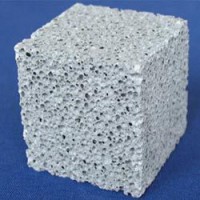Description
Foam Concrete: The Lightweight, High-Performance Building Material
Foam concrete, also known as cellular concrete, is a lightweight, versatile, and sustainable construction material offering a unique blend of strength, insulation, and ease of application. This innovative material is created by incorporating air bubbles into a cement-based mixture, resulting in a porous, yet surprisingly strong, structure. Unlike traditional concrete, foam concrete's lower density significantly reduces weight, making it easier to handle, transport, and install, while simultaneously improving its thermal and acoustic properties.
Key Features & Benefits:
- Exceptional Thermal Insulation: The high porosity of foam concrete provides excellent thermal insulation, reducing energy consumption for heating and cooling in buildings. This leads to lower energy bills and a smaller carbon footprint. Its R-value is significantly higher than traditional concrete, making it ideal for energy-efficient constructions.
- Superior Acoustic Insulation: The air pockets within the foam concrete effectively absorb sound waves, providing superior sound insulation compared to standard concrete. This is particularly beneficial in noise-sensitive environments like residential buildings, schools, and hospitals.
- Lightweight & Easy to Handle: Its significantly lower density compared to traditional concrete makes foam concrete easier to transport, handle, and place, reducing labor costs and construction time. This lightweight nature also reduces the load on building foundations.
- High Compressive Strength: Despite its lightweight nature, foam concrete boasts surprisingly high compressive strength, making it suitable for a wide range of applications, from infill walls and roof insulation to foundation fill and structural elements (depending on the mix design).
- Excellent Fire Resistance: Foam concrete offers excellent fire resistance, contributing to enhanced building safety and meeting stringent fire codes.
- Environmentally Friendly: Foam concrete utilizes readily available materials and its manufacturing process generates less waste compared to other construction materials. Its superior insulation also contributes to reduced energy consumption and lower carbon emissions.
- Versatile Applications: Foam concrete is suitable for a variety of applications including:
- Insulation: Walls, roofs, floors, and foundations.
- Fill Material: Void filling, leveling, and backfilling.
- Lightweight Concrete Blocks: Used in building construction.
- Structural Elements: (Depending on mix design) Lightweight walls and partitions.
- Slope Stabilization: For erosion control and land stabilization.
Specifications (Variable depending on mix design):
- Density: Ranges from 300 kg/m³ to 1800 kg/m³
- Compressive Strength: Varies depending on density and mix design.
- Thermal Conductivity: Significantly lower than traditional concrete.
- Water Absorption: Relatively low, contributing to its durability.
Choosing the Right Foam Concrete:
The optimal foam concrete mix design will depend on the specific application and desired properties. Factors such as density, compressive strength, and insulation requirements should be considered when selecting the appropriate product. Consult with a qualified professional to determine the best foam concrete solution for your project.
Conclusion:
Foam concrete is a high-performance building material offering significant advantages in terms of weight, insulation, strength, and sustainability. Its versatility and ease of use make it an ideal choice for a wide range of construction projects, contributing to more energy-efficient, comfortable, and environmentally friendly buildings.
